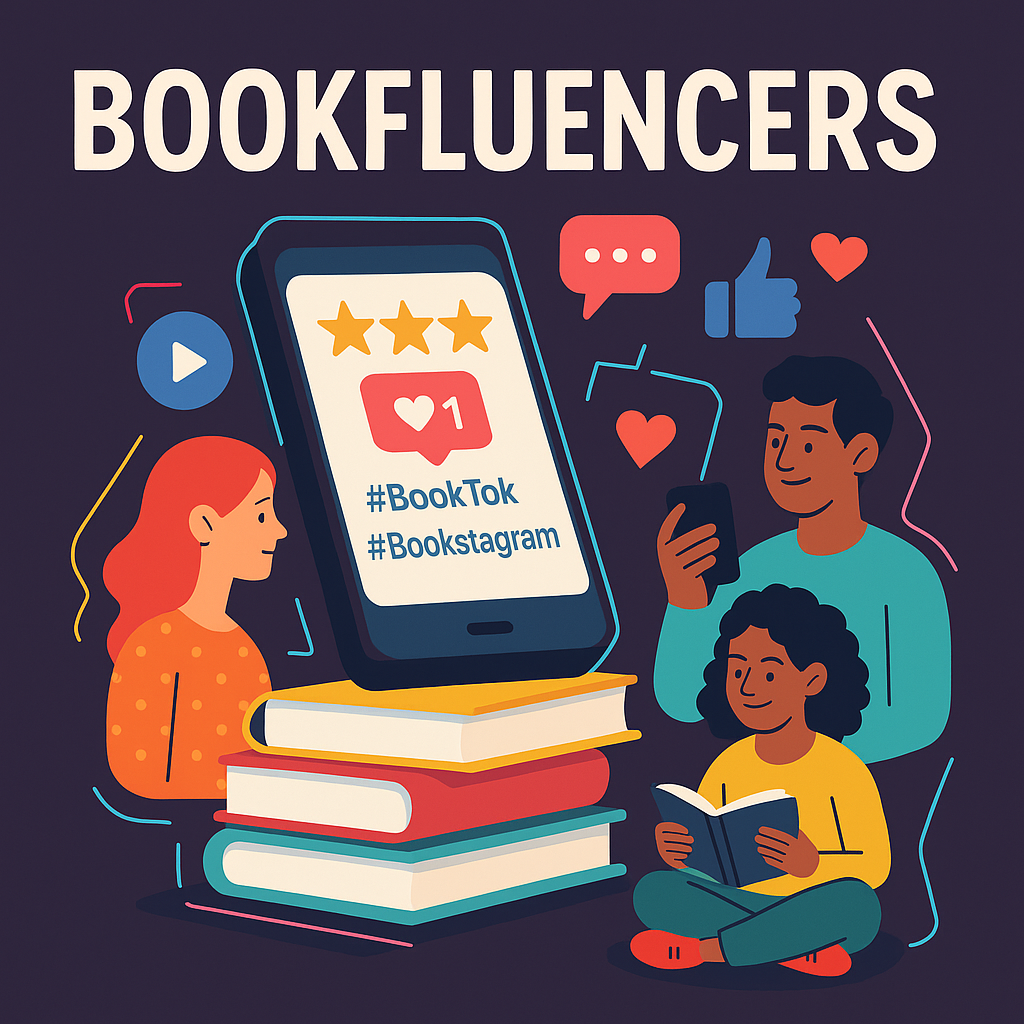Bookfluencers as Gatekeepers: How Publishing Is Listening to Social Media Tastemakers

There was a time when the fate of a book rested in the hands of editors, critics, and literary agents. A handful of decision-makers determined which voices would reach readers and which ones wouldn't. However, in recent years, those gatekeepers are no longer confined to publishing houses.
Today, a single viral TikTok can outsell a six-figure marketing campaign. A heartfelt review from a Bookstagrammer can push a debut novel into bestseller lists overnight. And when an influencer cries on camera about a plot twist, sales spike within hours. The power dynamic has shifted. Readers, not publishers, are driving the conversation nowadays — and bookfluencers are leading the charge.
Publishers have taken notice. The world's biggest houses are now monitoring #BookTok, partnering with influencers before a book is even released, and using engagement metrics as early indicators of market success. Acquisition teams are no longer asking only "Is the manuscript good?". The most important question is: "Will it trend?"
For authors, this new reality is both empowering and intimidating. The same platforms that give writers a direct line to millions of readers can also feel like an endless popularity contest — one where visibility often matters more than voice. And we all start like a small fish in the ocean when we try to build an audience from scratch.
The rise of bookfluencers represents one of the most significant cultural shifts in modern publishing. It blurs the lines between art, marketing, and community. But for indie authors especially, it also opens doors that traditional publishing once kept tightly closed.
In this article, we'll examine how influencers have become the new tastemakers in publishing, how publishers are adapting, and what this means for authors navigating the digital literary landscape.
The Rise of Bookfluencers
A few years ago, "book influencer" sounded like a niche corner of the internet — people quietly reviewing titles or sharing bookshelf aesthetics. Fast forward to 2025, and bookfluencers have become an industry force. They don't just recommend what to read next; they shape what gets published, who gets a deal, and which genres explode overnight.
Nowhere is this clearer than on BookTok, TikTok's thriving literary subculture. As of 2025, the #BookTok hashtag has surpassed 250 billion views, and videos tagged under it have driven millions of book sales worldwide. Major publishers now credit BookTok for breathing new life into backlist titles, reviving novels that had been sitting dormant for years.
But TikTok isn't alone. Bookstagram and BookTube communities have matured into full-fledged ecosystems — with influencers hosting author interviews, virtual book clubs, and collaborative campaigns that rival traditional publicity efforts. A single viral recommendation on Instagram or YouTube can catapult an unknown indie author into the top charts overnight.
The rise of bookfluencers has changed the rhythm of publishing. Algorithms now influence which books are discovered, how long they trend, and even the language used in blurbs and marketing copy. Some authors intentionally craft "quoteable" or "aesthetic" moments, hoping their stories will translate well into short-form content.
At its core, this is reader power in action — a grassroots movement where communities, not corporations, decide what deserves attention. However, it has also created a new kind of pressure for authors: being both a writer and a brand.
For publishers, this shift presents both opportunities and challenges. And as we'll see next, they're adapting fast.
How Publishers Are Responding
Publishers aren't just watching BookTok anymore — they're actively adapting their strategies to capitalize on it. What started as curiosity has evolved into full-scale integration. In 2025, social media data isn't just marketing fuel; it's part of the acquisition process.
Many major publishers now have dedicated teams that monitor trending hashtags, viral reviews, and influencer recommendations. A sudden spike in engagement around a particular trope or genre can trigger internal discussions about signing similar projects. When a self-published author goes viral, acquisition editors often move quickly, offering print deals to capitalize on momentum.
This isn't limited to TikTok. Instagram book tours, YouTube live launches, and even Discord book clubs are being folded into formal publicity plans. Some publishers have begun forming "creator-first" imprints — divisions focused on partnering directly with authors who already have online communities or influencer reach.
We recently spoke to a bestselling self-published author who built her success entirely on her own. After years of maintaining her audience and managing her brand across multiple platforms, she admitted that the workload became unsustainable. "It's rewarding, but it takes everything out of you", she said. "Staying visible, responding to readers, posting, planning — it's a full-time job on top of writing". Eventually, she signed with a traditional publisher — not because she needed validation, but because she needed relief.
Big publishers are capitalizing on that exhaustion. They're offering exclusive contracts to successful indie authors who've already proven their market potential, giving them access to marketing teams and stability in exchange for creative control and royalties.
Even smaller indie presses are adapting. Without big ad budgets, they're turning to micro-influencers — niche reviewers with a few thousand highly engaged followers. These smaller voices often deliver better ROI than celebrity campaigns because they build trust through authenticity.
The result is a publishing landscape where marketing begins long before a book is even printed — and where audience engagement can matter as much as the quality of writing.
What This Means for Indie Authors
For indie authors, this new landscape is both an opportunity and a pressure cooker. On the one hand, platforms like TikTok, Instagram, and YouTube provide writers with unprecedented access to readers. You don't need an agent, a marketing team, or a six-figure ad budget to build an audience — just a phone, a story, and consistency. Many self-published authors have gone viral, sold thousands of copies, and even secured traditional publishing deals based on a single post.
But the other side of that success is sustainability. The same authors who build thriving communities often admit that keeping them engaged can be a daunting task. Content creation, audience interaction, and staying on top of shifting trends can consume the very time and energy meant for writing. The creative process begins to compete with the algorithm.
That's the hidden tension in modern publishing: to stay visible, authors must also become marketers. For some, that's empowering — complete creative control, direct connection with readers, and real-time feedback. For others, it's draining — a constant balancing act between art and attention.
Worse still, virality has created a new kind of pressure: many writers now feel their success depends not just on their words but on their online persona. A quiet literary author might struggle to stand out against high-energy video creators. At the same time, genre writers who thrive in short-form storytelling often find themselves chasing trends rather than craft.
The result is a publishing world where being a great writer is no longer enough — you also need to be discoverable, relatable, and algorithm-friendly. For indie authors trying to juggle everything on their own, the workload can easily snowball into burnout.
But with the right strategy, this shift can also work in their favour — and that's where the next section comes in.
The Business Side — When Influence Becomes Currency
In the age of bookfluencers, visibility itself has become a form of currency. The most successful creators don't just sell books — they build ecosystems. A viral video can translate into speaking engagements, sponsorships, affiliate revenue, and publisher collaborations. In some cases, influencers earn more from brand deals than from actual book sales.
Publishers have caught on. Many now budget for influencer partnerships the same way they once did for bookstore tours or magazine ads. Instead of buying ad space, they're buying authenticity — or at least the appearance of it. Paid promotions, affiliate links, and sponsored "reading lists" are now standard parts of launch campaigns.
But this shift has also blurred ethical lines. Readers often struggle to distinguish between genuine and paid recommendations, and many influencers are hesitant to disclose sponsorships due to concerns about losing trust. The line between community enthusiasm and commercial influence has never been thinner.
For authors, especially indies, this new system can be both an equaliser and a trap. It's an equaliser because influence isn't confined to those with traditional publishing deals — a single creator with a passionate following can outsell a corporate marketing team. But it's a trap when the pressure to "perform" overshadows the work itself.
Some creators have even started collaborating directly with publishers to curate imprints or co-brand releases. This isn't entirely new — celebrity book clubs have existed for decades — but what's different now is the speed and scale of their impact. A creator can make or break a book in 24 hours, and publishers are betting on that immediacy.
The business of storytelling has evolved into a hybrid of creativity, community, and commerce. Influence isn't just marketing — it's market power. And understanding how to navigate it has become a key skill for every modern author.
PubliWrite's Perspective — Empowering Authors in the Age of Influence

At PubliWrite, we believe that influence should empower authors — not exhaust them. The rise of bookfluencers has changed how books are discovered, but it hasn't changed the core truth: great stories deserve to be found. What's missing in today's landscape is balance — a way for authors to stay visible without sacrificing their creativity or sanity.
That's why PubliWrite was built to support writers at every stage of that journey.
- Social media amplification → Every new book published through PubliWrite is promoted across our official channels, helping authors reach broader audiences without the pressure of constant self-promotion.
- Creator Studio with beta reader access → Build buzz early by sharing drafts with trusted readers, getting feedback, and creating an authentic community around your work before launch day.
- Author promotion programs → Optional campaigns connect authors with reviewers, bloggers, and micro-influencers in their genre, expanding their audience without the need to manage outreach manually.
- Royalty transparency → 80% royalties on ebooks and printed books (after production costs), with real-time tracking — so you always know what your influence is worth.
Our goal is to give indie authors the tools big publishers reserve for their top creators — without exclusivity or gatekeeping. Because the future of publishing shouldn't depend on how loud you can shout online, but on how well your story resonates with readers.
Final Thoughts — The New Gatekeepers
For centuries, publishing houses decided which stories reached readers. Today, that power has shifted — not to the authors, but to the audience. And yet, between algorithms, social media trends, and influencer-driven hype, a new kind of gatekeeping has quietly emerged.
Bookfluencers aren't the villains of modern publishing — most are genuine book lovers who use their platforms to share stories that move them. But their influence has become so powerful that it can now shape entire genres, careers, and even corporate publishing strategies. In 2025, visibility isn't just luck — it's a form of currency.
For indie authors, this world can feel both thrilling and exhausting. The same platforms that open doors to readers also demand constant engagement and self-promotion. However, with the right tools and community support, it's possible to find a middle ground — one where creativity drives visibility, rather than the other way around.
At PubliWrite, we believe that every author should have a fair shot at being discovered — not because of algorithms or influencer deals, but because their story deserves to be read. The future of publishing shouldn't belong to gatekeepers — old or new — but to creators and readers who share the same love of storytelling.
👉 How about you? Do you think bookfluencers have too much power in shaping what people read? Or are they simply giving readers a stronger voice in the publishing industry?
👉 Share your thoughts in the comments — I'd love to hear how you see the future of influence in books.
Before you go:️️
- Follow us: X | LinkedIn | Instagram | Meta
- Visit our website at https://publiwrite.com





